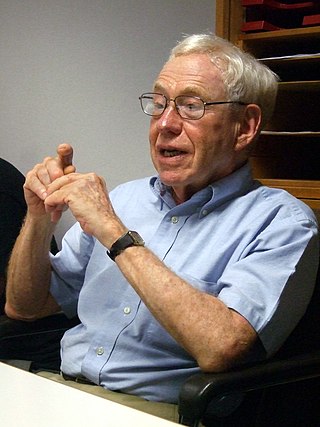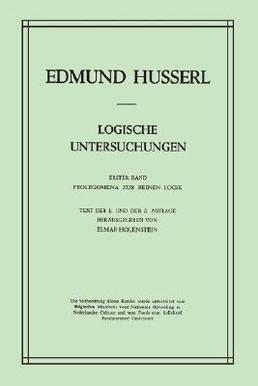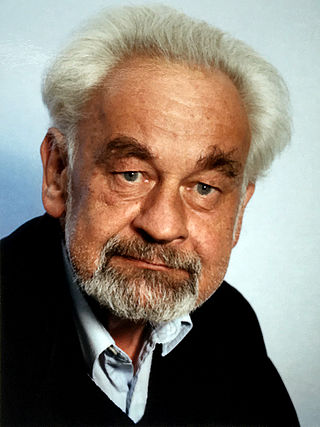Related Research Articles

Edmund Gustav Albrecht Husserl was an Austrian-German philosopher and mathematician who established the school of phenomenology.

Martin Heidegger was a German philosopher who is best known for contributions to phenomenology, hermeneutics, and existentialism. He is among the most important and influential philosophers of the 20th century. He has been widely criticized for supporting the Nazi Party after his election as rector at the University of Freiburg in 1933, and there has been controversy about the relationship between his philosophy and Nazism.

Hermeneutics is the theory and methodology of interpretation, especially the interpretation of biblical texts, wisdom literature, and philosophical texts. Hermeneutics is more than interpretative principles or methods used when immediate comprehension fails and includes the art of understanding and communication.
Phenomenology is the philosophical study of the structures of experience and consciousness. As a philosophical movement it was founded in the early years of the 20th century by Edmund Husserl and was later expanded upon by a circle of his followers at the universities of Göttingen and Munich in Germany. It then spread to France, the United States, and elsewhere, often in contexts far removed from Husserl's early work.

Continental philosophy is a term used to describe some philosophers and philosophical traditions that do not fall under the umbrella of analytic philosophy. However, there is no academic consensus on the definition of continental philosophy. Prior to the twentieth century, the term "continental" was used broadly to refer to philosophy from continental Europe. A different use of the term originated among English-speaking philosophers in the second half of the 20th century, who used it to refer to a range of thinkers and traditions outside the analytic movement. Continental philosophy includes German idealism, phenomenology, existentialism, hermeneutics, structuralism, post-structuralism, deconstruction, French feminism, psychoanalytic theory, and the critical theory of the Frankfurt School as well as branches of Freudian, Hegelian and Western Marxist views.

Being and Time is the 1927 magnum opus of German philosopher Martin Heidegger and a key document of existentialism. Being and Time had a notable impact on subsequent philosophy, literary theory and many other fields. Though controversial, its stature in intellectual history has been compared with works by Kant and Hegel. The book attempts to revive ontology through an analysis of Dasein, or "being-in-the-world." It is also noted for an array of neologisms and complex language, as well as an extended treatment of "authenticity" as a means to grasp and confront the unique and finite possibilities of the individual.

Hubert Lederer Dreyfus was an American philosopher and professor of philosophy at the University of California, Berkeley. His main interests included phenomenology, existentialism and the philosophy of both psychology and literature, as well as the philosophical implications of artificial intelligence. He was widely known for his exegesis of Martin Heidegger, which critics labeled "Dreydegger".

In late modern continental philosophy, neo-Kantianism was a revival of the 18th-century philosophy of Immanuel Kant. The Neo-Kantians sought to develop and clarify Kant's theories, particularly his concept of the "thing-in-itself" and his moral philosophy.
Existential phenomenology encompasses a wide range of thinkers who take up the view that philosophy must begin from experience like phenomenology, but argues for the temporality of personal existence as the framework for analysis of the human condition.
Phenomenology in architecture can be understood as a discursive and realist attempt to understand and embody the philosophical insights of phenomenology.
In Being and Time, the philosopher Martin Heidegger made the distinction between ontical and ontological, or between beings and "being" as such. He labeled this the "Ontological Difference." It is from this distinction that he developed the concept of "Fundamental Ontology."
Dermot Moran is an Irish philosopher specialising in phenomenology and in medieval philosophy, and he is also active in the dialogue between analytic and continental philosophy. He is currently the inaugural holder of the Joseph Chair in Catholic Philosophy at Boston College. He is a member of the Royal Irish Academy and a founding editor of the International Journal of Philosophical Studies.
Christian Lotz is a German-American philosopher currently teaching at Michigan State University. Lotz's work primarily focuses on 19th and 20th Century European philosophy, continental aesthetics, critical theory, Marxism, and contemporary European political philosophy.

The Logical Investigations are a two-volume work by the philosopher Edmund Husserl, in which the author discusses the philosophy of logic and criticizes psychologism, the view that logic is based on psychology.
The Crisis of European Sciences and Transcendental Phenomenology: An Introduction to Phenomenological Philosophy is an unfinished 1936 book by the German philosopher Edmund Husserl.
Thomas Sheehan is an American philosopher who is the current professor at the Department of Religious Studies, Stanford University and Professor Emeritus at the Department of Philosophy, Loyola University Chicago. He is known for his books on Heidegger and Roman Catholicism. His philosophical specialties are in philosophy of religion, twentieth-century European philosophy, and classical metaphysics. He is the author of The First Coming, a controversial account of Easter.

Buddhist thought and Western philosophy include several parallels.
Early phenomenology refers to the early phase of the phenomenological movement, from the 1890s until the Second World War. The figures associated with the early phenomenology are Edmund Husserl and his followers and students, particularly the members of the Göttingen and Munich Circles, as well as a number of other students of Carl Stumpf and Theodor Lipps, and excludes the later existential phenomenology inspired by Martin Heidegger. Early phenomenology can be divided into two theoretical camps: realist phenomenology, and transcendental or constitutive phenomenology.

Burt C. Hopkins is an American philosopher. He is an Associate Member of the University of Lille, Permanent Faculty member of the Summer School of Phenomenology and Phenomenological Philosophy, Ca' Foscari University of Venice, former Professor and Chair of Philosophy at Seattle University (1989-2016) and Permanent Secretary of the Husserl Circle.

Thomas Seebohm was a phenomenological philosopher whose wide-ranging interests included, among others, Immanuel Kant, Edmund Husserl, hermeneutics, and logic. Other areas of Professor Seebohm's interests included the history of philosophy, philosophy of history, philosophy of the formal sciences, methodology and philosophy of the human sciences, the history of 19th century British Empiricism, American pragmatism, analytic philosophy, philosophy of law and practical philosophy, and the development of the history of philosophy in Eastern Europe. Despite this diverse span of interests, Seebohm was chiefly known as a phenomenologist, who "above all...considered himself a creative phenomenologist, who as a critically reflecting philosopher would look at all major issues with which he became confronted, from a transcendental phenomenological point of view."